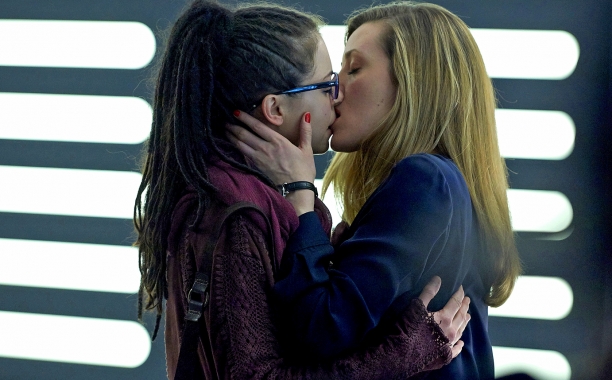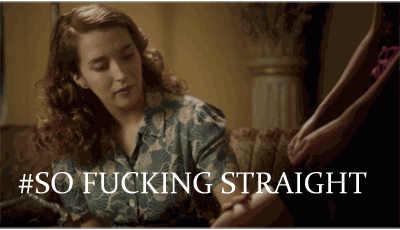This guest post written by Alenka Figa appears as part of our theme week on Bisexual Representation.
[Trigger warning: Discussion of suicide and suicidal ideation]
When it comes to exciting portrayals of complex, realistic women on television, Orphan Black is a stand out. The entire premise focuses on how women are often portrayed as one-note and interchangeable, and flips that concept on its head. Similarly, the show places several exceptional queer characters front and center. Whether it’s Felix (Jordan Gavaris) painting phallus-filled murals while doing mountains of emotional labor to hold Clone Club together, Cosima (Tatiana Maslany) doing science to solve complex genetic mysteries, Tony (Tatiana Maslany) committing crimes hardcore enough to involve bullets, or Delphine (Évelyne Brochu) attempting corporate takeovers and doing even more science on the side, each queer person has a story arc and personality outside of their sexualities. In its most recent season, Orphan Black again upped the ante: they revealed that Sarah Manning (Tatiana Maslany), the clone who first introduced us to this whole, glorious mess, is also bisexual.
Orphan Black is not a perfect example of bisexual representation done right; as Erin Tatum noted in her article, season one delivered a Delphine with all the markings of the Duplicitous Bisexual trope. However, outside of her romance with Cosima, Delphine is a layered and interesting character. Her storylines are exciting; as a scientist who has been connected to Neolution from the get-go, she had the leverage to become a political player, and while she values power, she also strives to maintain her moral code. Personally, I have more of a soft spot for Cosima – dear Orphan Black writers, please know that whenever Cosima cries, I lose it – but I found the non-romantic aspects of her and Delphine’s intertwined storylines more compelling.
“The Antisocialism of Sex,” an episode from season 4 in which everyone fell apart, did away with all those “Romance? Meh,” feelings. At the beginning of the episode, it’s clear that Sarah has hit rock bottom. Her plan to barter with Evie Cho (Jessalyn Wanlim) and secure a cure backfired, resulting in Kendall (Alison Steadman)’s death and the loss of Cosima’s research data – which could mean losing Cosima and all her sisters to the illness built into their DNA. Haunted by visions of Beth (Tatiana Maslany), Sarah embarks on a reckless bender that seems to be leading her to suicide. However, as she drowns her emotions in whiskey shots, she searches for another way to drown, or perhaps to cling onto life: sex, specifically a hook-up that involves another woman.
There are several possible, trope-ridden errors that the writers could have made in this scene. At this point in the series, it would be easy to write this encounter off as a straight woman engaging in a threesome, or as writers pandering to an audience who have come to expect Sarah to have some sexy scenes. However, the entire hook-up is crafted to emphasize that Sarah’s primary interest is in Elle (Brooke Palsson), the woman. When Sarah first scans the crowd she briefly spies Tito (James Cade) – who Elle refers to as “my man” – but the camera quickly pans over to Elle, who bites her lower lip at Sarah. The camera then pulls back to give us a full body shot of Elle before cutting to Sarah, whose gaze has ceased to wander and is clearly focused on this new woman. Sarah puts her arm around Elle first, takes her hand to pull her to the dance floor, touches Elle’s hips, and even gives Tito a dark look when he breaks up their initial smooch fest. While she’s clearly invested in a threesome, her distinct attraction to Elle is distinctly present.
This scene, a scene in which an assumed-to-be heterosexual protagonist casually courts another woman, is significant because Sarah is one of three queer women – two of whom are bi – on a single television show, each of whom experiences their queerness differently.
Anyone fortunate enough to have many queer-identified friends will confirm that queer – and bi, pan, fluid, and gay – women are real, complex human beings with diverse personalities. As real human beings do, queer women carry their experiences differently. Some have been so comfortable with their identities for so long that it doesn’t occur to them to disclose, while others purposefully avoid labels because no label feels quite right, or because they hope to challenge assumed heterosexuality, and for myriad other reasons. Others bear the burden of internalized biphobia, anxiety, and other mental health issues tied to having a stigmatized identity. Some want to share their pride in their sexuality by discussing it loudly. However, if you look to television or film, what you generally get are bisexual characters whose main personality trait is being a Bisexual Trope. Tokenization narrows the world’s view of bisexual people, and it is so commonplace that each one-dimensional, denigrating portrayal is another kick against a bi fighter already down.
A pleasant side effect of placing multiple and unique queer women on the same screen is that tropes and stereotypes have less weight. When it clicked in my mind that Sarah is also bisexual, I immediately felt more invested in Cosima and Delphine. These are three very different women with different narratives, inhabiting their queerness in three disparate ways. Rather than seeing myself represented in a single character, I felt seen because I knew that my unique experience of my own identity was just as valid as those on the screen. I am queer and I am bi, but my queerness is not your queerness, and that is beautiful.
The only way we will reach a tipping point for bisexual representation is to put multidimensional bi characters on-screen at the same time — Orphan Black has given us a taste of the excitement and joy such representation offers. It’s time for everyone else to try harder, and do better.
See also at Bitch Flicks:
Feminism in Orphan Black
Why We Need to Stop Worshipping the Elusive Heteroflexible Femme
Trans Men on TV: Orphan Black and Tony the Trans Bandit
Orphan Black: It’s All About the Ladies
Alenka Figa is a queer, feminist, wannabe librarian. She spends her days teaching people how to attach things to their email, watching Steven Universe, and twittering nonstop about comics and her cat at @alenkafiga.












